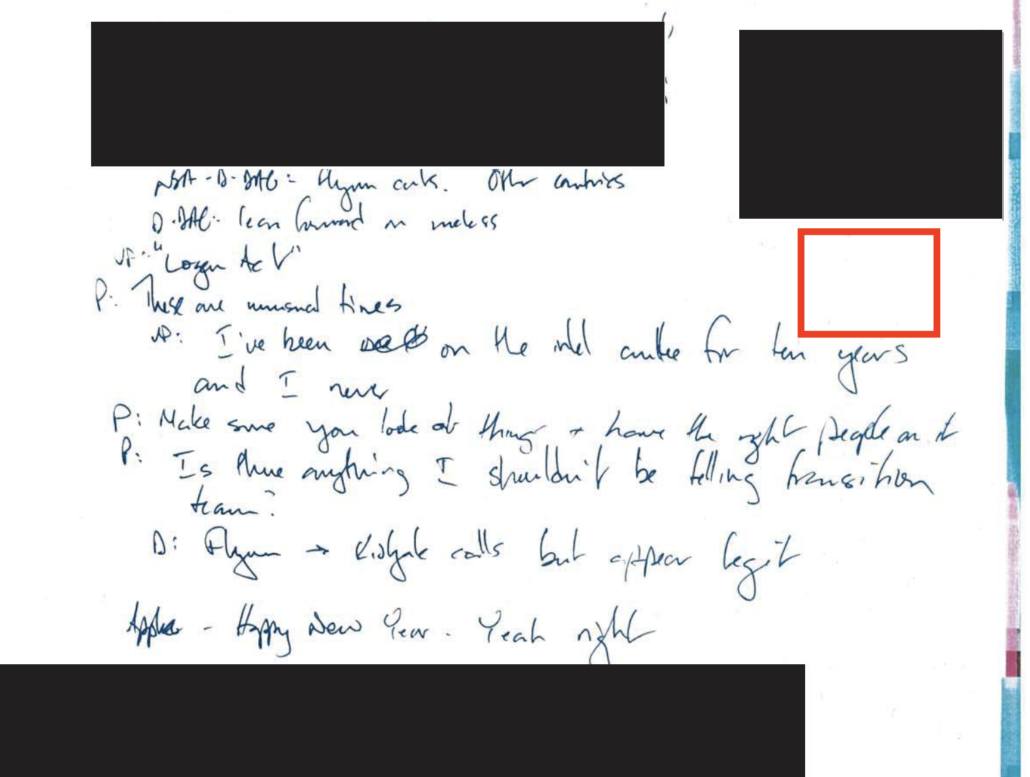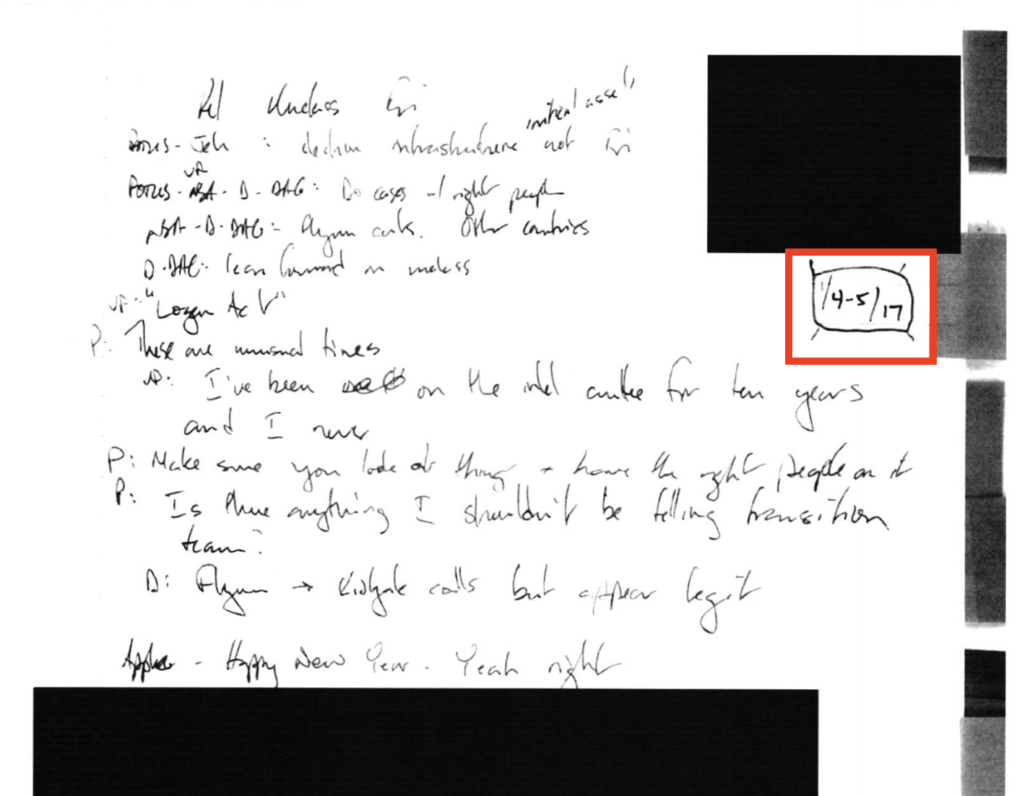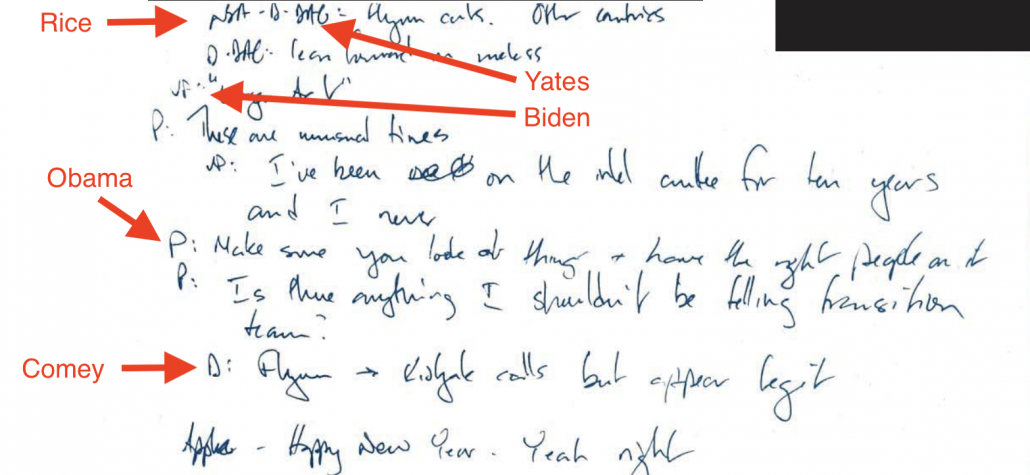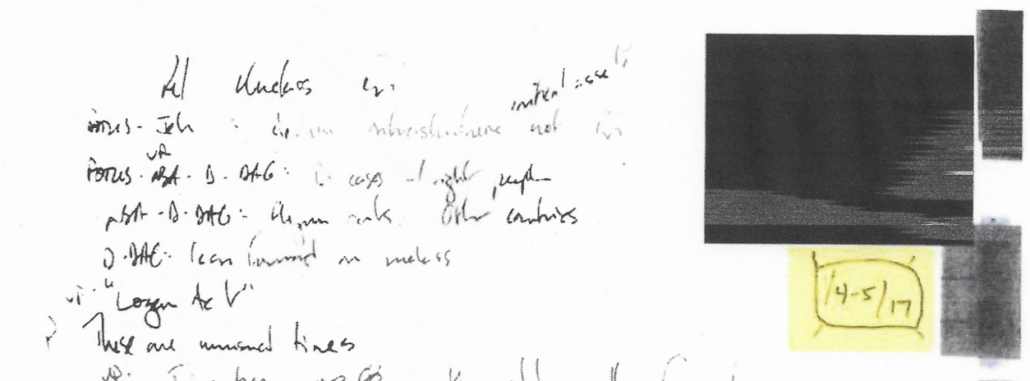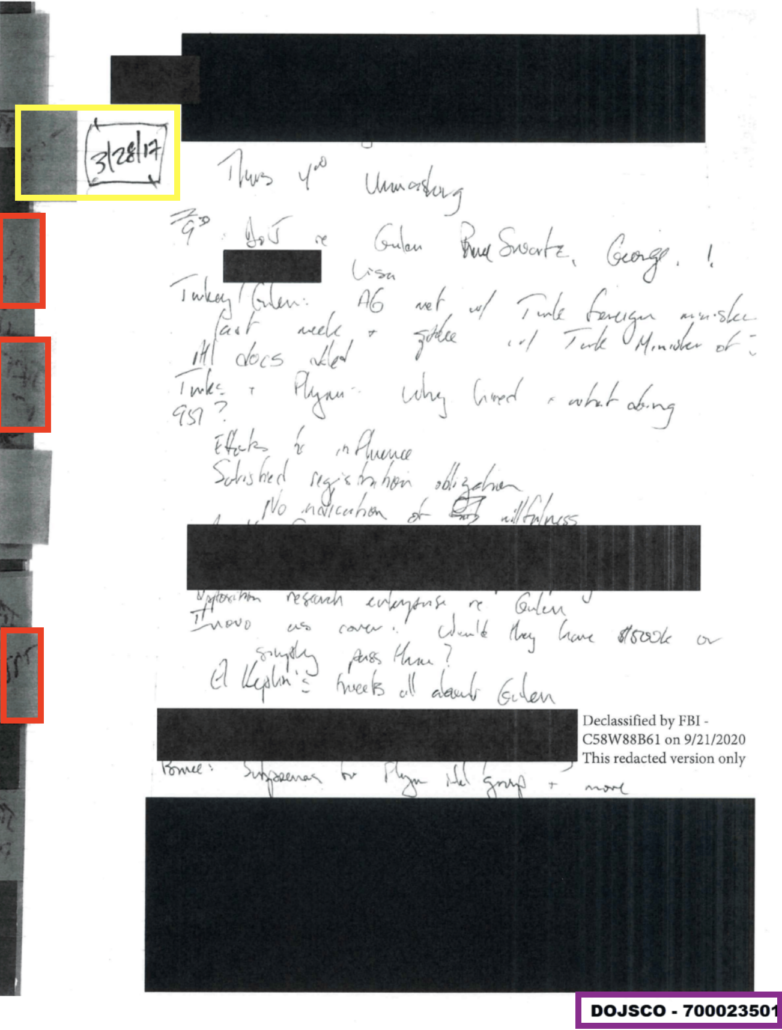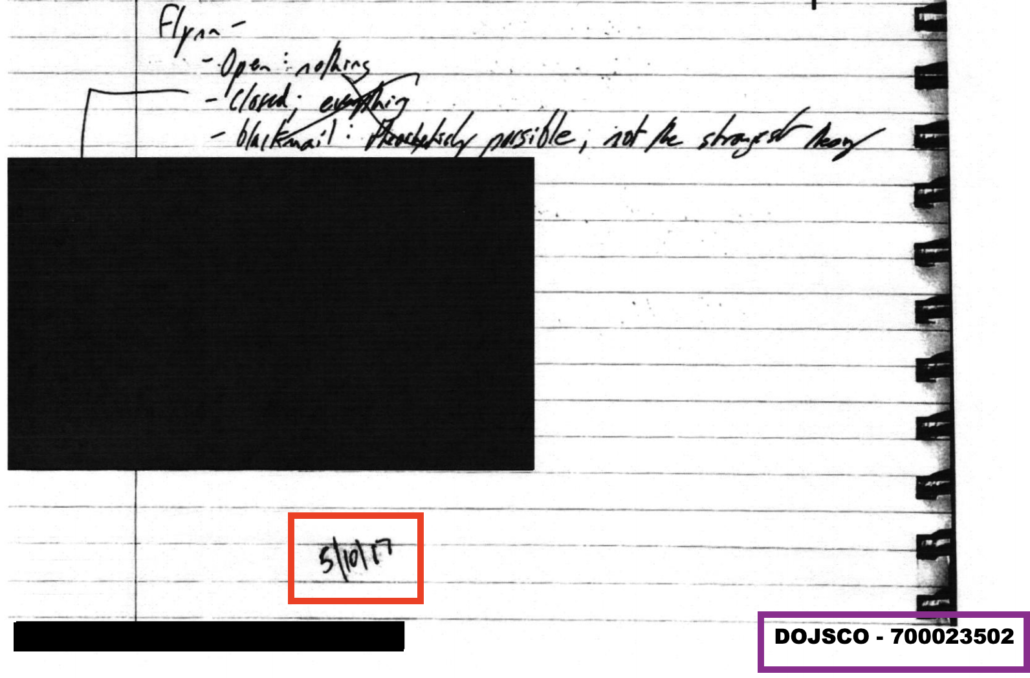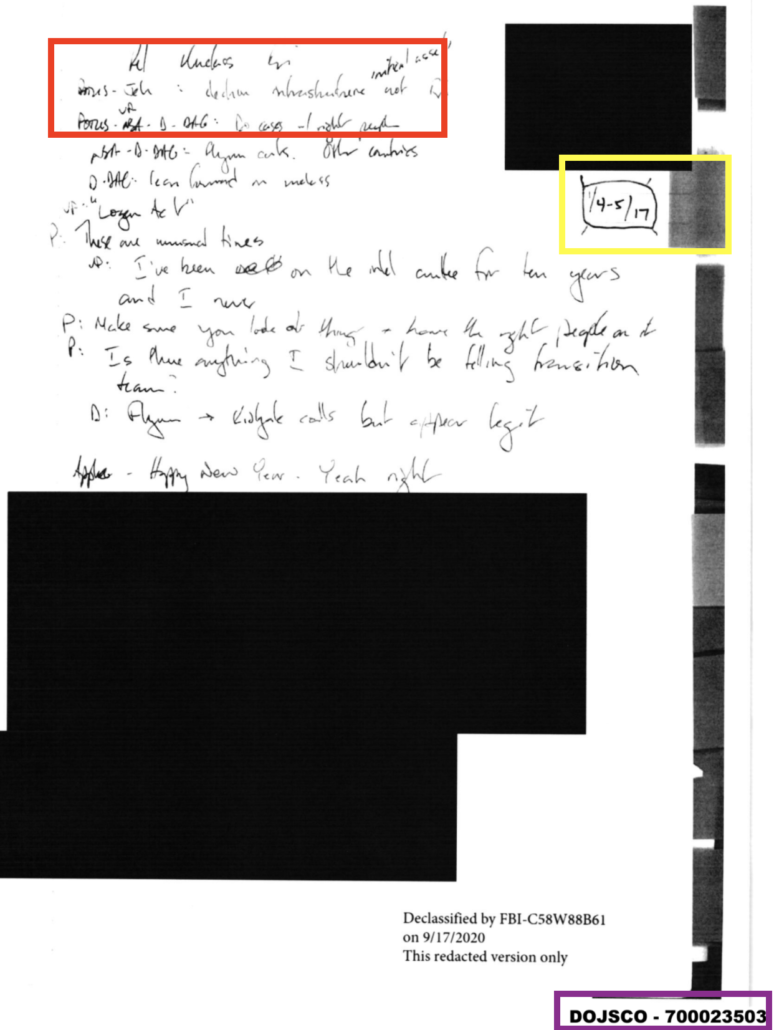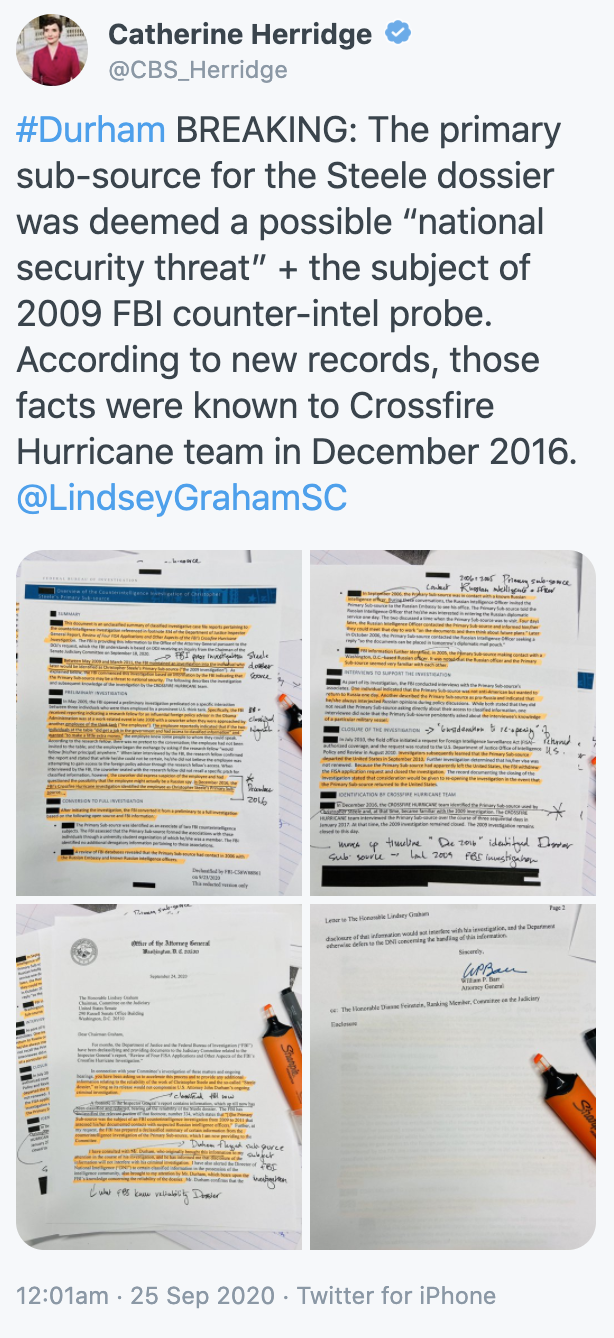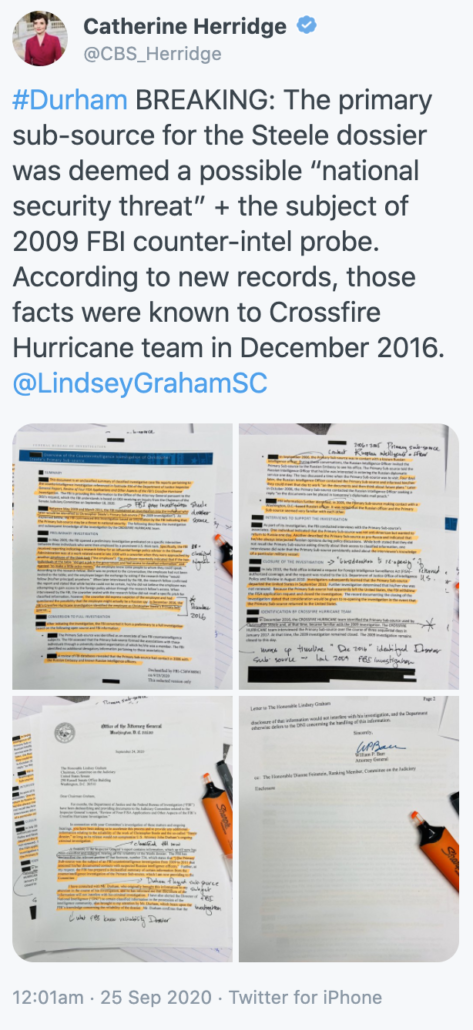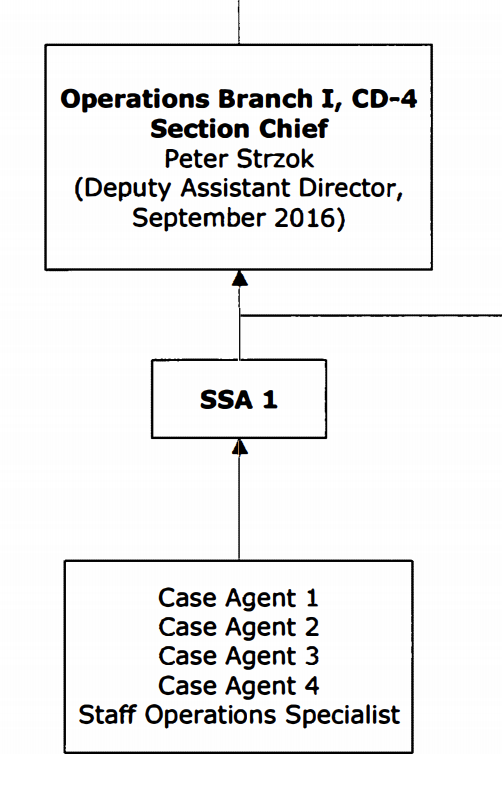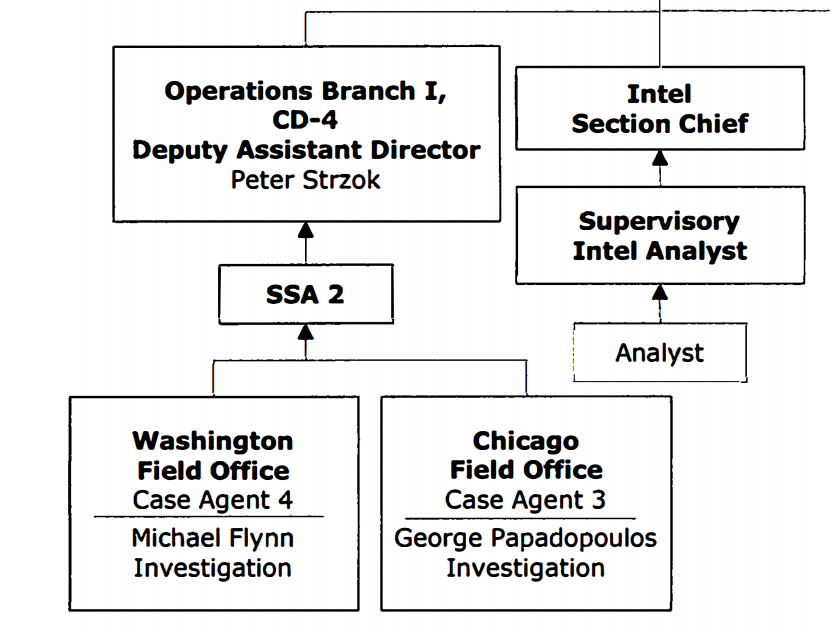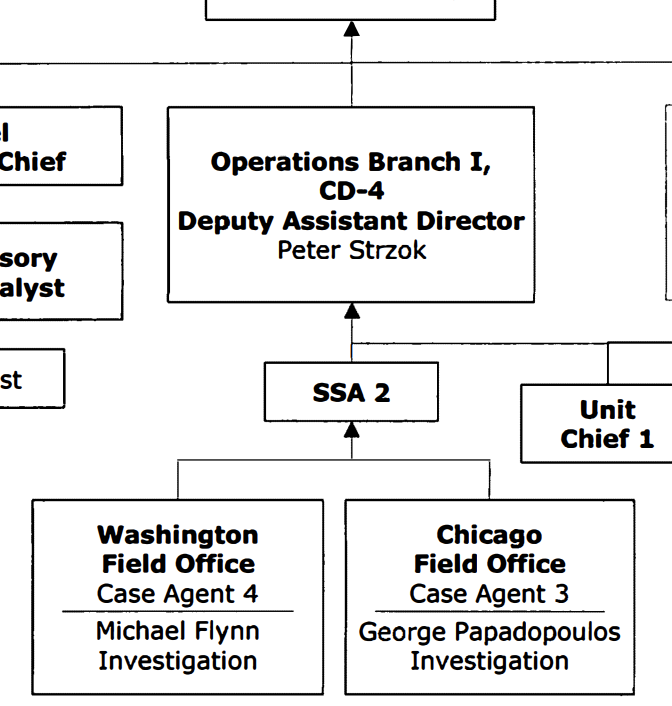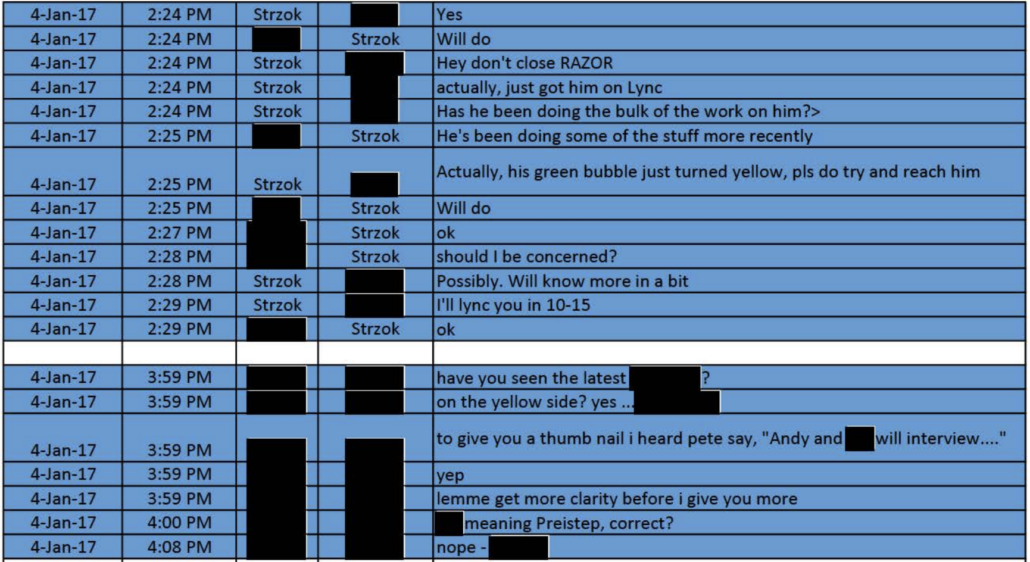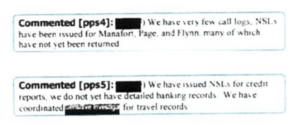I didn’t even unpack all the glaring inconsistencies in William Barnett’s 302 in this post. But given that his statement does contradict both itself and the public record, I want to examine the story that it tells from a different view.
His 302 shows that an FBI Agent was retained on the investigation even after DOJ IG investigated Mueller team texts that — I’ve been told — should have shown he sent pro-Trump texts from his FBI phone (DOJ IG has declined to comment about this). It shows that he remained on the case even after claiming on at least three occasions to want off the case. He remained on, he explains, to prevent “group think” about Mike Flynn’s guilt (even though his own 302 professes to be unaware of several key pieces of evidence, and the 302 redacts at least one other piece of evidence he dismissed). And by remaining on the case, his testimony reveals but does not admit explicitly, he prevented the Mueller team from reaching a conclusion that might have supported a quid pro quo charge.
It has always been inexplicable why Mike Flynn got the sweet plea deal he did, a False Statements charge letting him off for secretly working for a foreign government while getting classified briefings with the candidate, particularly given that — unlike Rick Gates — it was always clear Flynn didn’t want to fully cooperate (and did not fully cooperate, professing not to remember key repeated contacts regarding a back channel with Russia that the White House tried to cover up in other ways).
And now William Barnett is taking credit for all that.
Barnett remained on the Mike Flynn case after trying four times to stay off it
Not explained in Barnett’s 302 is how he ended up investigating Mike Flynn through to prosecution when he repeatedly expressed a disinterest in doing so.
Barnett started, in August 2016, tasked to investigate both Paul Manafort and Mike Flynn. He describes any actions he took early on in the Flynn investigation to be an effort to clear the investigation (and he spoke of it, at all times, in terms of criminal activity, not threats to national security, in spite of his own closing memo admitting that the investigation also investigated the latter). A possible interview in the post-election period, the interview that happened on January 24, the review of call records that would disclose further lies from Flynn, and other evidence that remained redacted — all that was, in Barnett’s mind, just box-checking in advance of closing the investigation. At numerous times in his 302, he seems to suggest he would have been happy to continue on the Manafort investigation, but wanted off the Flynn one.
His 302 describes how, in early 2017 (when false allegations about Andrew McCabe were beginning to be floated, but before an FBI Investigation Division into them started), he asked to be taken off the case.
In or about early February 2017, BARNETT discussed his wish to be removed from the RAZOR investigation with FBI Unit Chief [Unit Chief] and [Special Agent]. [Unit Chief and Special Agent] asked why BARNETT wished to be removed from the investigation. BARNETT said the Inspector General (IG) was looking at the Clinton Case and BARNETT believed the RAZOR investigation was problematic and could result in an IG investigation. FBI policy does not allow for an agent to pick and choose his/her cases. An agent can request to be removed from a case. If an agent is not removed but wanted to leave, they could do a “sit down strike,” meaning the agent asks for approval to do everything and creates enough problems to have them removed from the case.
In spite of providing an explanation of how Barnett could have gotten off the case if he really wanted to, he did not do so (even though it’s possible that the delay in obtaining call records reflects such a sit down strike).
Then, again in April, Barnett exchanged notes with an analyst who wanted off the case. In his testimony, he described that he believed the “collusion” theory that the call records would have supported, “did not make sense.”
BARNETT was asked about a Lync message on 04/06/2017 from [Analyst 1] to BARNETT regarding [Analyst 1] being removed from the RAZOR investigation. BARNETT said [Analyst 1] was very skeptical of the FLYNN collusion [sic] investigation. BARNETT also thought it was a “dumb theory” that did not make sense.
Then, apparently after the appointment of Mueller in May, Barnett tried to undermine any investigation into Flynn by not briefing on it, at a briefing specifically called to review Flynn. This is the passage taken by credulous readers as damning to Jeannie Rhee, when it in fact shows that Barnett was insubordinate and rude.
BARNETT was told to give a brief on FLYNN to a group including SCO attorney Jean Rhee (RHEE), [four other people], and possibly [a fifth] BARNETT said he briefly went over the RAZOR investigation, including the assessment that there was no evidence of a crime, and then started to discuss [redacted — probably Manafort] which BARNETT thought was the more significant investigation. RHEE stopped BARNETT’s briefing [redacted] and asked questions concerning the RAZOR investigation. RHEE wanted to “drill down” on the fees FLYNN was paid for a speech FLYNN gave in Russia. BARNETT explained logical reasons for the amount of the fee, but RHEE seemed to dismiss BARNETT’s assessment. BARNETT thought RHEE was obsessed with FLYNN and Russia and she had an agenda. RHEE told BARNETT she was looking forward to working together. BARNETT told RHEE they would not be working together.
After this briefing, Barnett told someone — almost certainly Brandon Van Grack — that he didn’t like Rhee and didn’t want to be on the Flynn investigation.
BARNETT expressed his concern about RHEE to [SCO Atty 1, probably Van Grack]. BARNETT told [probably Van Grack] that he wanted nothing to do with the RAZOR investigation.
In spite of saying, repeatedly, that he didn’t want to work on the Flynn case, Barnett affirmatively chose to continue on it, to prevent others from “group think.”
On the day following the brief that BARNETT provided to RHEE, BARNETT was contacted by STRZOK. STRZOK said he (STRZOK) really wanted BARNETT to work with the SCO. STRZOK said he (STRZOK) knew BARNETT had a problem with RHEE. BARNETT told STRZOK that he (BARNETT) wanted to work [redacted–probably Manafort] and did not wish to pursue the collusion investigation as it was “not there.” STRZOK said he (STRZOK) would run interference between BARNETT and RHEE. [Probably Van Grack] and STRZOK told BARNETT he (STRZOK) could work on things other than what RHEE was looking into. BARNETT decided to work at the SCO hoping his perspective would keep them from “group think.”
So: Barnett expresses a wish to get off the Flynn case in February, he expresses a wish to get off the Flynn case in April, in May, he says he wants nothing to do with the Flynn case while refusing to brief on it, and then he affirmatively chose to stay on the Flynn case, in hopes of preventing others from “group think.”
There’s some real proof that Robert Mueller (and Peter Strzok!!) sought out people who had it in for Trump!
I actually think it was a good thing that Mueller included skeptics. But Barnett is not just a skeptic; in his 302 he misstated what the evidence showed.
Barnett ignores or dismisses at least four pieces of evidence implicating Flynn
Barnett’s 302 records him claiming that there was “no” evidence showing Trump directed Flynn, even calling such a suspicion “astro projection.”
BARNETT said numerous attempts were made to obtain evidence that TRUMP directed FLYNN concerning [redacted] with no such evidence being obtained. BARNETT said it was just an assumption, just “astro projection,” and the “ground just kept being retreaded.”
Ultimately, Barnett offered a different reason why Flynn (and KT McFarland) told what he admits were clear lies: they were just trying to keep — or get — a job.
Regarding FLYNN, some individuals in the SCO assumed FLYNN was lying to cover up collusion [sic] between the TRUMP campaign and Russia. BARNETT believed FLYNN lied in the interview to save his job, as that was the most plausible explanation and there was no evidence to contradict it.
Barnett’s stated opinion is, like most things pertaining to Flynn, precisely the conclusion drawn institutionally by the Mueller team, best expressed in Flynn’s sentencing memo: Flynn started telling lies in response to the Ignatius report, and then just kept lying.
Except Barnett repeatedly dismisses evidence that makes it clear that’s not true.
Barnett describes FBI responding to the David Ignatius article revealing Flynn’s calls with Sergey Kislyak, and not Flynn’s public lies about them. Every single other witness asked about this investigation and abundant contemporaneous evidence has said the lies, not the article, were the motivating factor behind FBI’s increased attention. Barnett’s testimony doesn’t even admit they exist.
Then Barnett was asked about — something — that remains redacted.

Clearly, whatever this was, other witnesses seem to have believed it cause cause for concern. Barnett doesn’t agree.
Then Barnett describes what might have been call records showing that Mike Flynn’s lies had served to cover up his coordination with Mar-a-Lago in advance of his calls to Sergey Kislyak, disclosing another lie (and probably the point of his other lies) to the FBI.
BARNETT said the information gathered was what was expected to be found and there was, in BARNETT’s opinion, no evidence of criminal activity and no information that would start a new investigative direction.
Later, he says that the NSL returns, which would have disclosed call records that show further lies on Flynn’s part were not evidence that Flynn was working with the Russian government.
The information obtained through the NSLs did not change BARNETT’s mind that FLYNN was not working with the Russian government.
This answer is a tell, both about Barnett and those interviewing him. When the FBI obtained call records that showed that Mike Flynn’s lies served to cover up his consultation with Mar-a-Lago before calling Kislyak, it would have raised questions about the White House. That is, those call records made it clear that there might be another suspect reason for Flynn’s activities, because he was directed by Trump to pay off a quid pro quo (which is the reason a Main DOJ-approved sentencing memo argued might have been the explanation).
Then, not mentioned here at all, is the Flynn testimony that he and KT McFarland wrote a cover email to hide that he had spoken about sanctions with Kislyak.
After the briefing, Flynn and McFarland spoke over the phone. 1258 Flynn reported on the substance of his call with Kislyak, including their discussion of the sanctions. 1259 According to McFarland, Flynn mentioned that the Russian response to the sanctions was not going to be escalatory because they wanted a good relationship with the incoming Administration.1260 McFarland also gave Flynn a summary of her recent briefing with President-Elect Trump. 1261
The next day, December 30, 2016, Russian Foreign Minister Sergey Lavrov remarked that Russia would respond in kind to the sanctions. 1262 Putin superseded that comment two hours later, releasing a statement that Russia would not take retaliatory measures in response to the sanctions at that time. 1263 Hours later President-Elect Trump tweeted, “Great move on delay (by V. Putin).” 1264 Shortly thereafter, Flynn sent a text message to McFarland summarizing his call with Kislyak from the day before, which she emailed to Kushner, Bannon, Priebus, and other Transition Team members. 1265 The text message and email did not include sanctions as one of the topics discussed with Kislyak. 1266 Flynn told the Office that he did not document his discussion of sanctions because it could be perceived as getting in the way of the Obama Administration’s foreign policy.1267 [my emphasis]
Nor does Barnett mention that — at a time when the only known communications to Trump were through McFarland — Flynn told Kislyak that Trump was aware of their conversation.
FLYNN: and, you know, we are not going to agree on everything, you know that, but, but I think that we have a lot of things in common. A lot. And we have to figure out how, how to achieve those things, you know and, and be smart about it and, uh, uh, keep the temperature down globally, as well as not just, you know, here, here in the United States and also over in, in Russia.
KISLYAK: yeah.
FLYNN: But globally l want to keep the temperature down and we can do this ifwe are smart about it.
KISLYAK: You’re absolutely right.
FLYNN: I haven’t gotten, I haven’t gotten a, uh, confirmation on the, on the, uh, secure VTC yet, but the, but the boss is aware and so please convey that. [my emphasis]
While that’s not proof that Trump ordered Flynn to undermine sanctions, it is clear Flynn told Russia that Trump had been apprised about the content of their calls before the last call with Kislyak.
Of the evidence that is public, then, Barnett claims the following does not exist:
- Flynn publicly lied in response to the Ignatius story, creating a counterintelligence risk
- Call records showed that, on top of all his other lies about the substance of his calls with Sergey Kislyak, Flynn lied about coordinating with Mar-a-Lago before making those calls
- Flynn testified that he wrote an email summarizing his call so as to hide that he and Kislyak had discussed sanctions
- Flynn told Kislyak — at a time when his only known communications with Trump went through McFarland — that Trump was aware of the calls by December 31
In fact, Barnett doesn’t even mention a fifth piece of evidence: Steve Bannon’s testimony.
While the testimony of Steve Bannon described in the Mueller Report (which may post-date Barnett’s involvement on the Mueller team) disclaims knowledge of any discussions of sanctions in advance, in the the HPSCI transcripts, Bannon revealed that the White House had scripted him to provide a bunch of no answers to HPSCI.
MR. SCHIFF: Mr. Bannon, who wrote these questions?
[Discussion off the record.]
MR. BANNON: My understanding, Mr. Schiff, is that these came from the transcript.
MR. SCHIFF: No, no, no. The questions that Mr. Conaway just asked you the questions. I asked you earlier if you had been authorized by the White House to answer all in the negative. Who wrote these questions?
MR. BANNON: Same answer.
MR. SCHIFF: What’s the same answer? Who wrote the questions?
MR. BANNON: My understanding is they came from the transcript.
MR. SCHIFF: What transcript are you talking about?
MR. BANNON: This transcript of my first interview.
[snip]
MR. SCHIFF: Well, how were they produced? How do you know that the White House has authorized you to answer them? [Discussion off the record.]
MR. BANNON: My counsel informed me that these were the questions the White House authorized me to answer.
MR. SCHIFF: But you didn’t write these questions?
MR. BANNON: No.
MR. SCHIFF: And your counsel didn’t write these questions?
MR. BANNON: No.
MR. SCHIFF: So these questions were supplied to you by the White House?
[Discussion off the record.]
MR. BANNON: As far as I know.
One of the questions that Bannon described — shortly before his first interview by the Mueller team — being scripted by the White House to answer no to was any discussion about sanctions after inauguration.
MR. CONAWAY: Once you were part of the administration, were you a part of any discussions about how to approach the Russian, vis-à-vis the sanctions, whether to do away with them or in any way minimize the effects of the sanctions?
MR. BANNON: No.
The scripted answer pointedly did not ask whether Bannon discussed them beforehand, one he may not have been able to answer in the same way.
Barnett describes undermining the quid pro quo case against Donald Trump
Particularly given that Barnett may not have been around anymore when Bannon started testifying, much less started testifying honestly (which didn’t start until much later), the KT McFarland testimony is particularly important to this narrative.
Barnett describes that he was the only one who believed that KT McFarland was telling the truth when she said that she did not remember Trump directing Flynn’s efforts to undermine sanctions. Significantly, he describes this question as — in Mueller’s view — “key to everything.”
Many at the SCO had the opinion that MCFARLAND had knowledge TRUMP was directing [sanction discussions] between FLYNN and the Russian Ambassador. When MCFARLAND did not provide the information sought, it was assumed she was lying. When BARNETT suggested it was very possible MCFARLAND was providing truthful information, one of the SCO attorneys participating in the interview said BARNETT was the only person who believed MCFARLAND was not holding back the information about TRUMP’s knowledge of [the sanction discussions]. MUELLER described MCFARLAND as the “key to everything” because MCFARLAND was the link between TRUMP, who was at Mar-a-Lago with MCFARLAND, and FLYNN, who was in the Dominican Republic on vacation, when [the calls] were made.
Again, it is stunning that Barnett was permitted to give this answer without being asked about the call records, which showed Flynn lied about consulting with Mar-a-Lago, to say nothing about the way that McFarland’s forgetfulness matched Flynn’s and then her unforgetting similarly matched Flynn’s. It’s not a credible answer, but Jeffrey Jensen doesn’t need credible answers.
Then, having made it clear that he believed that Mueller treated McFarland as the “key to everything,” BARNETT described how he single-handedly managed to prevent the entire team from concluding that Trump was in the loop.
BARNETT was told at one point he was being taken off the MCFARLAND proffer interview because SCO attorneys thought would be easier for MCFARLAND to talk without BARNETT there, due to her attitude toward BARNETT during past interviews.
McFarland has complained publicly about being caught in a perjury trap by the FBI agents who first interviewed her (and the 302s show a continuity among the FBI agents), so Fox viewers have actually seen evidence that McFarland had a gripe with Barnett.
BARNETT insisted he be on the interview. When BARNETT was told he would not be allowed on the interview, BARNETT suggested he might take the matter to the Inspectors General or to “11.” BARNETT believed some at SCO were trying to get MCFARLAND to change her story to fit the TRUMP collusion [sic] theory. [Probably Van Grack] later contacted BARNETT and said BARNETT would be part of the MCFARLAND interview.
During the proffer interview with MCFARLAND, the “obstruction team” was leading the interview. BARNETT described the “obstruction team’s” questions as general. They did not ask follow-up or clarifying questions. BARNETT was perplexed by their lack of asking follow-up questions. BARNETT began asking MCFARLAND follow-up questions and direct questions. BARNETT was trying to “cut to the chase” and obtain the facts. BARNETT asked questions such as “Do you know that as a fact or are you speculating?” and “Did you pass information from TRUMP to FLYNN?” Andrew Goldstein (GOLDSTEIN), a SCO Attorney, called “time-out” and cautioned BARNETT by saying, “If you keep asking these questions, we will be here all day.”
It’s unclear whether Barnett’s depiction is correct or not. The 302 of that interview is heavily redacted, but doesn’t show a “time out” in it. What matters for the purposes of this post is that Barnett is claiming he singlehandedly prevented McFarland from implicating the President. And the conclusions of the Report on this point adopt Barnett’s view, so he may be right.
Some evidence suggests that the President knew about the existence and content of Flynn’s calls when they occurred, but the evidence is inconclusive and could not be relied upon to establish the President’s knowledge.
[snip]
Our investigation accordingly did not produce evidence that established that the President knew about Flynn’s discussions of sanctions before the Department of Justice notified the White House of those discussions in late January 2017.
What this 302 does, then, is show that:
- Barnett joined Mueller’s team solely to avoid concluding that Mike Flynn was involved in “collusion”
- He claims to be unaware of at least four pieces of evidence showing the contrary
- Having disclaimed knowledge of evidence that is public, he takes credit for the conclusion that there was no quid pro quo
For what its worth, Jerome Corsi — in language that is hilariously close to Barnett’s — claimed to have prevented Mueller from obtaining “the key” piece of evidence, an explanation of how Stone got foreknowledge of the WikiLeaks releases. And Andrew Weissmann’s book apparently describes the sharing of poll data as another such “key” piece of evidence. So it’s not the case that Barnett singlehandedly prevented Mueller from showing a quid pro quo or some other kind of conspiracy. But he did prevent two key witnesses from being more aggressively questioned about it.
Barnett’s shit-show 302 may have been really poorly timed
This 302 — and the witness that gave it — would not do well under competent cross-examination. There are just too many internal contradictions, too many instances where Barnett professes to be unaware of public evidence, too many times that Barnett’s current claims conflict with his past actions taken as an FBI Agent, too many times his claims conflict with the public record.
Which is why it’s interesting that (as Adam Goldman has pointed out), Barnett is not among those witnesses demanded in an investigation at Senate Judiciary Committee led by Flynn associate Barbara Ledeen. Lindsey Graham’s subpoena request asks for documents and testimony from virtually everyone else in this investigation, but not Barnett.
Trisha Anderson, Brian Auten, James Baker, William Barr, Dana Boente, Jennifer Boone, John Brennan, James Clapper, Kevin Clinesmith, James Comey, Patrick Conlon, Michael Dempsey, Stuart Evans, Tashina Gauhar, Carl Ghattas, Curtis Heide, Kathleen Kavalec, David Laufman, Stephen Laycock, Jacob Lew, Loretta Lynch, Andrew McCabe, Mary McCord, Denis McDonough, Arthur McGlynn, Jonathan Moffa, Sally Moyer, Mike Neufield, Sean Newell, Victoria Nuland, Bruce Ohr, Nellie Ohr, Stephanie L. O’Sullivan, Lisa Page, Joseph Pientka, John Podesta, Samantha Power, E.W. “Bill” Priestap, Sarah Raskin, Steve Ricchetti, Susan Rice, Rod Rosenstein, Gabriel Sanz-Rexach, Nathan Sheets, Elizabeth Sherwood-Randall, Glenn Simpson, Steve Somma, Peter Strzok, Michael Sussman, Adam Szubin, Jonathan Winer, Christopher Wray, and Sally Yates
After the WaPo released an unbelievably credulous article on Barnett’s testimony the other day, SJC tweeted it out as a Committee press release.

Apparently, Lindsey and Barbara Ledeen (who served as a channel in efforts to discredit the investigation) don’t think Barnett could withstand competent cross-examination on these issues, either.
As it happens, though, the interview was done before — but released after — two key decisions, which will give Lisa Page, Peter Strzok, and Andrew McCabe discovery into the events that led to the public disclosure of their texts (in the first two cases) or their firing (in the latter two).

While not originally included in the discovery requests in this case, against the background of the claims he made in his 302, Barnett’s testimony would be relevant to numerous inquiries pertinent to one or several of these lawsuits, including:
- Why Barnett wasn’t removed from the Mueller team when his texts exhibited (as I’ve been told they would have) pro-Trump bias
- If Barnett’s texts indeed exhibited a pro-Trump bias, why his texts weren’t also made public when Page and Strzok’s were
- Whether Barnett was the source behind two claims sourced by right wing propagandists who first floated the claims to Agents involved in the Mike Flynn case, but always debunked by actual firsthand witnesses, that Andrew McCabe had it in for Mike Flynn
The latter is a particularly important point. The McCabe IG investigation that ultimately led to his firing stemmed from attempts to understand who sourced that right wing propaganda about McCabe, claims that started by May 2017, not long after the time Barnett claims he knew there would be an IG Investigation of the Flynn investigation, claims that continued through the time that Barnett threatened to launch the IG investigation that he once claimed he wanted no part of.
Barnett is now on the record with testimony that conflicts with the public record, including with regards to McCabe’s micro-management of the investigation. Particularly given the hints that he has an ongoing relationship with staffers in Congress who floated these claims, it seems at least plausible he was the source for one or both of those investigations, investigations he seemingly predicted before anyone else did.
At the very least, Barnett’s easily falsifiable claims — including about McCabe’s actions themselves — in this 302 would seem to give McCabe reason to ask for Barnett’s phone records and witness testimony to DOJ IG, if not a deposition.
So while SJC doesn’t seem to think Barnett could withstand cross-examination on these claims, by releasing this 302 in advance of potential discovery (which will take forever), DOJ may have made that more likely.
Update: Fixed the description about the “boss” comment.


